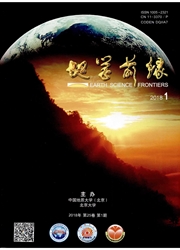

 中文摘要:
中文摘要:
伸展条件下的地壳拆离作用是岩石圈减薄的重要浅部构造响应。晚中生代时期的伸展构造(包括拆离断层、变质核杂岩构造和断陷盆地)在华北、华南、东北和东蒙古及贝加尔地区普遍发育,它们切过上部地壳(断陷盆地)、中、上地壳(拆离断层)或中部地壳(变质核杂岩)。地壳拆离作用具有运动学极性(NWW或SEE)、几何学宏观(区域)对称与微观(局部)不对称性、遍布全区但不均匀性,以及形成时间的跨越性(140~60Ma)等特点,并使得地壳和岩石圈发生显著的减薄。本文研究揭示出现令岩石圈厚度变化与晚中生代伸展构造的发育程度和分布之间并没有必然的联系。其变化的基本规律是,除新生代裂陷发育区岩石圈厚度明显较小且厚度有迅速变化外,从华北向贝加尔地区总体的变化趋势是逐渐加厚,也即东亚地区岩石圈具有楔形形态。晚中生代时期的地壳(或地幔)拆离作用伴随着广泛的岩石圈减薄作用,区域岩石圈同时遭受到一定程度的减薄和破坏,华北克拉通在这一时期的破坏仅仅是区域岩石圈减薄在华北的具体体现。
 英文摘要:
英文摘要:
Extensional crustal detachment is the most important tectonic response of lithosphere thinning. Late Mesozoic extensional structures, i. e. , detachment faults, metamorphic core complexes and extensional basins, are widely distributed in North, S, outh and Northeast China, eastern Mongolia and Baikal. The detachment faults associated with these extensional structures may root into either the upper crust (detachment faults of extensional basins), upper to middle crust (detachment faults), or middle crust (detachment faults in metamorphic core complexes). Crustal detachment has the following characteristics: kinematic polarity in NWWSEE direction, geometrically regional symmetry and local asymmetry, widely and heterogeneously distributed, long term formation, etc. Detachment of crust leads to thinning of both the crust and the lithosphere. The variation in lithosphere thickness of the present lithosphere in EaSt Asia is not related to the degree of development and distribution of Late Mesozoic extensional structures. A general tendency is that the thickness of the present lithosphere becomes thicker and thicker from eastern North China to Baikal or the lithosphere is wedge-shaped, except that there are always abrupt changes due to Cenozoic rifting. The Late Mesozoic detachment of crust (or coeval detachment in mantle) resulted in extensive lithosphere thinning. The lithosphere in a vast area from Baikal to eastern North China was thinned and destructed. The destruction of the North China carton in the Late Mesozoic was not a unique event, but a part of the regional lithosphere thinning.
 同期刊论文项目
同期刊论文项目
 同项目期刊论文
同项目期刊论文
 期刊信息
期刊信息
